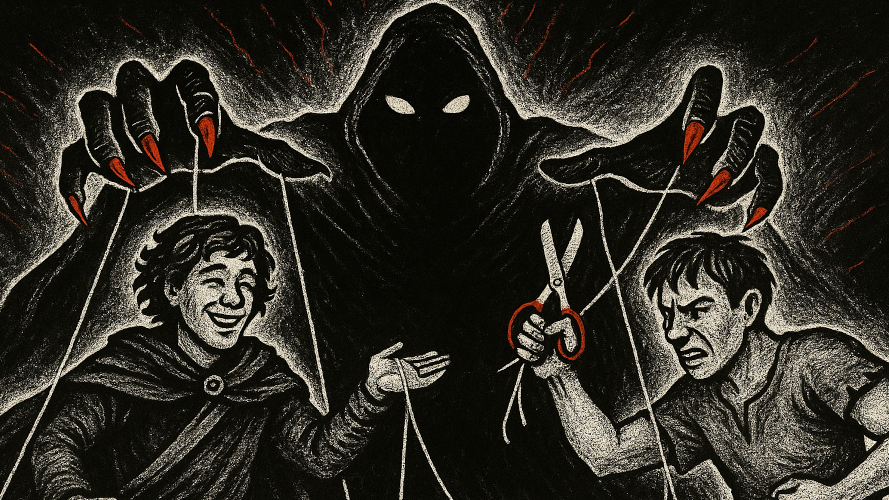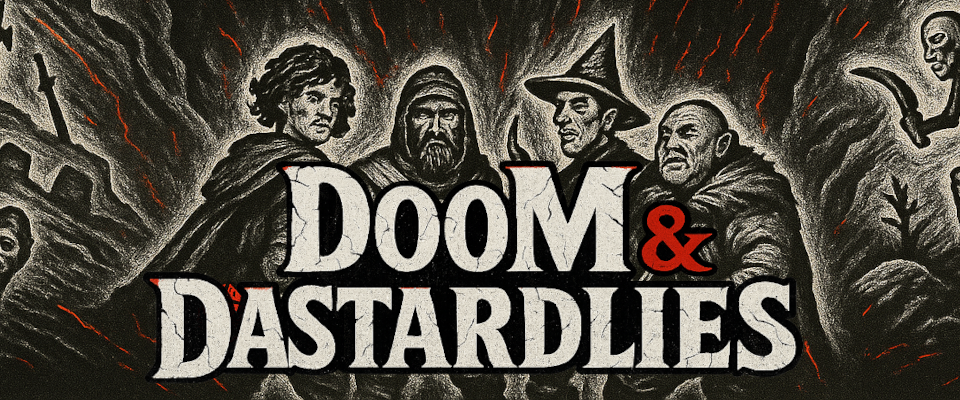DooM?

 Per la versione in italiano scorri in fondo.
Per la versione in italiano scorri in fondo.
 English
English
At first glance, DooM might seem like just a whimsical god in a chaotic fantasy world. But let’s be honest: DooM is parody. DooM is critique.
The name, the acronym, the attitude—all point to one thing: the “Good Master™” archetype. You know the one. The all-powerful DM who hides behind the screen, fudges rolls, controls everything, and calls it "narrative flexibility."
DooM & Dastardlies turns that dynamic on its head.
The God Behind the Screen
DooM is a capricious god. But DooM is also Destiny. A metaphor for the inescapable unfairness of life, or worse, the person who thinks they know what kind of story everyone else should be in.
Some DMs behave like that. They have a story to tell, and everyone else is just there to witness it. And for many players, that's fine. They enjoy being part of a story they didn't write.
But in DooM & Dastardlies, players can try being narrators too. They bluff, they lie, they bend fate—just like DooM does. They can even perform arcane Miracles, and momentarily feel what it's like to be divine.
Shared Power
DooM seems in control. The players try to impress, appease, challenge it. But mechanically, DooM has less power than it seems.
Players roll dice behind the screen. They narrate. They decide what to risk and when to twist the truth. DooM can "believe" or "doubt," but the real authority? It's slippery. It's shared. It shifts.
What starts as divine oversight becomes a desperate bid for Faith. Because just like the entertainer-DM trope, DooM craves attention. And attention here is power.
Breaking the Railroad
Sure, there are dungeons. Sure, there are Trials. But the moment players understand they can admit failure and still move forward, something shifts. They stop playing to win. They start playing to explore, to provoke, to twist the story. They test DooM. They break the plan. And that is exactly the plan.
Everyone Plays
DooM is still a player. Not an author. Not a referee. Not a martyr who sacrifices fun to "make the story work." The game was designed with this in mind:
- No role should be more responsible or less fun than others.
- Imperfection and bias are part of the system.
- Dice should inspire, not dictate.
- Characters are tools, not obstacles.
Call for Reflections
What do you think of DooM? Have you ever felt like DooM at your table? Or sat across from one? Share your thoughts, stories, and heresies in the comments. And if you have feedback on the mechanics or philosophy of DooM & Dastardlies, I’m listening.
A version of the manual for international blind playtesting is in the works. Meanwhile, stay tuned, and enjoy the chaos.
 Italiano
Italiano
A prima vista, DooM potrebbe sembrare solo una divinità bizzarra in un mondo fantasy caotico. Ma diciamoci la verità: DooM è una parodia. DooM è una critica.
Il nome, l'acronimo, il suo atteggiamento: tutto richiama l'archetipo del "Bravo Master™". Quello onnipotente, che tira i dadi dietro lo schermo, che controlla ogni cosa e la chiama "libertà narrativa".
DooM & Dastardlies ribalta tutto questo.
La Divinità dietro lo schermo
DooM è un dio capriccioso. Ma è anche il Destino. Una metafora dell'ingiustizia della vita, o peggio ancora, della persona che crede di sapere che storia dovrebbero vivere gli altri.
Ci sono master che si comportano così. Hanno la loro storia da raccontare, e tutti gli altri al tavolo sono solo spettatori. A molti giocatori questo piace: stare ad ascoltare, farsi guidare, godersi la narrazione.
Ma in DooM & Dastardlies i giocatori possono provare a fare i narratori. Possono bluffare, mentire, piegare il fato, proprio come fa DooM. Possono perfino compiere Miracoli con la magia arcana, e sentirsi per un attimo divini.
Il potere condiviso
DooM sembra avere il controllo. I giocatori cercano di compiacerlo, di sfidarlo, di conquistarlo. Ma meccanicamente, DooM ha meno potere di quanto sembri.
I giocatori tirano i dadi dietro lo schermo. Narrano. Decidono cosa rischiare e quando alterare la verità. DooM può "credere" o "dubitare", ma l'autorità vera? È instabile. È condivisa. È fluida.
Ciò che sembra onnipotenza, diventa bisogno disperato di Fede. Come certi Master che vogliono essere al centro della scena, anche DooM dipende dagli altri per sentirsi reale.
Uscire dai binari
Ci sono dungeon. Ci sono Prove. Ma appena i giocatori capiscono che possono dichiarare un fallimento senza per forza bluffare e andare comunque avanti, cambia tutto. Smettono di giocare per vincere. Iniziano a giocare per esplorare, per provocare, per rompere la storia. Mettono alla prova DooM. Fanno deragliare il piano. E questo è il piano.
Tutti Giocano
Anche DooM è un giocatore. Non è un autore. Non è un arbitro. Non è un martire che si sacrifica per far divertire gli altri. Il gioco è stato pensato così:
- Nessun ruolo deve avere più responsabilità o meno divertimento degli altri.
- L'imperfezione e la soggettività sono parte del sistema.
- I dadi devono ispirare, non decidere.
- I personaggi sono strumenti, non vincoli.
Cosa ne pensi?
Hai mai fatto il DooM al tavolo? O ti sei mai trovato di fronte a uno? Parliamone nei commenti: racconta esperienze, dubbi o altro.
Il manuale è in fase di test. Una versione per il blind playtest è in arrivo. Intanto...
📢 Unisciti ai playtest in italiano! Iscriviti per provare DooM & Dastardlies, aiutami a farlo crescere e partecipa a creare qualcosa di diverso. Il manuale non è ancora pubblico: si riceve solo partecipando.
Che ne pensi di DooM? Come affronteresti il suo potere instabile? Come dovrebbe comportarsi chi lo interpreta? Ogni spunto è benvenuto!
DooM & Dastardlies
The first RPG where players roll the dice behind the screen
| Status | In development |
| Category | Physical game |
| Author | stefanovetrini |
| Genre | Adventure |
| Tags | Dark, Dice, Dungeon Crawler, Fantasy, One-shot, OSR, Parody, Tabletop role-playing game |
| Languages | English, Italian |
More posts
- Back to the Alpha?87 days ago
- Rule of Fun?Aug 12, 2025
- Isekai?Aug 06, 2025
- Dastardlies?Jul 21, 2025

Leave a comment
Log in with itch.io to leave a comment.